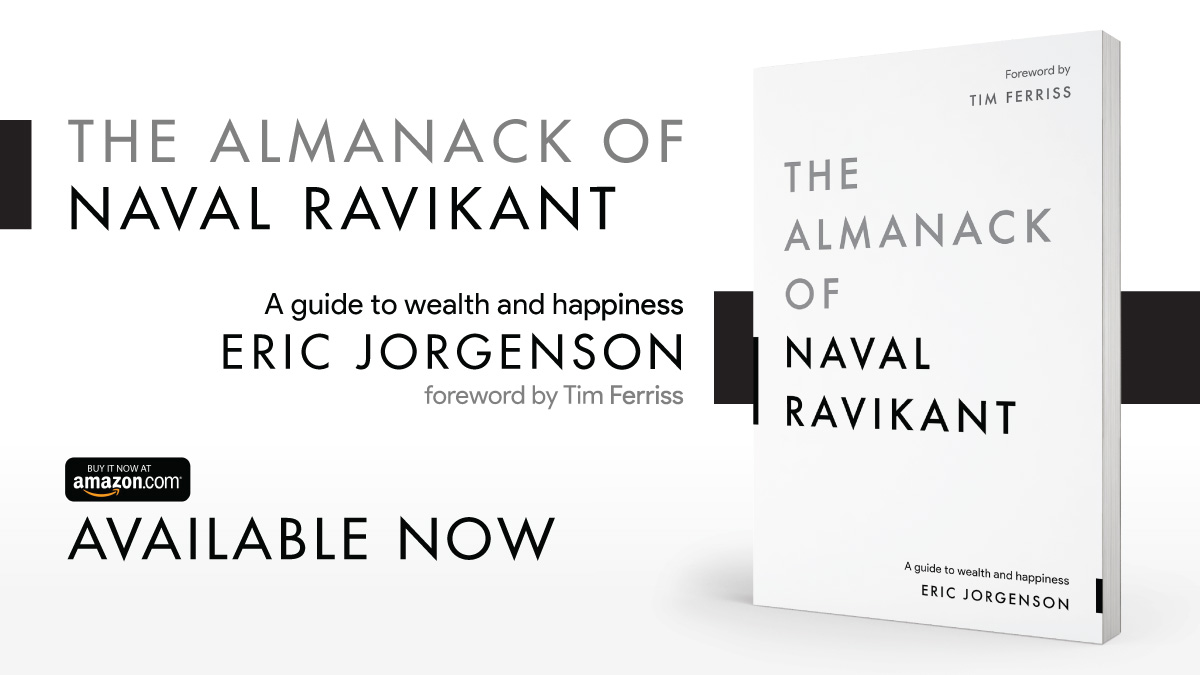Just re-read 'The Almanack of @naval'
Despite scraping his Twitter library for the @NavalBot, @EricJorgenson included a tonne of gems I'd never heard before.
Here's my favourite 17 highlights below...
THREAD...
Despite scraping his Twitter library for the @NavalBot, @EricJorgenson included a tonne of gems I'd never heard before.
Here's my favourite 17 highlights below...
THREAD...
"Making money is not a thing you do –– it's a skill you learn." - Naval
"You should not grind at a lot of hard work until you figure out what you should be working on." - Naval
"You should not grind at a lot of hard work until you figure out what you should be working on." - Naval
"If you're looking toward the long-term goal of getting wealthy, you should ask yourself:
1. Is this authentic to me?
2. Is it myself that I am projecting?
3. Am I productising it?
4. Am I scaling it with capital, code, media or leverage? - Naval
1. Is this authentic to me?
2. Is it myself that I am projecting?
3. Am I productising it?
4. Am I scaling it with capital, code, media or leverage? - Naval
"If you're not 100% into it, somebody else who is 100% into it will outperform you.
And they just won't outperform you by a little bit –– they'll outperform you by a lot because now we're operating the domain of ideas, compound interest and leverage really applies." - Naval
And they just won't outperform you by a little bit –– they'll outperform you by a lot because now we're operating the domain of ideas, compound interest and leverage really applies." - Naval
"We live in the age of infinite leverage, and the economic rearss for genuine intellectual curiosity have never been higher." - Naval
"If it entertains you now but will bore you someday, it's a distraction. Keep looking." - Naval
"If it entertains you now but will bore you someday, it's a distraction. Keep looking." - Naval
"If they can train you to do it, then eventually they will train a computer to do it." - Naval
"Forget rich vs poor, white-collar vs blue. It's now leveraged vs un-leveraged." - Naval
"Forget rich vs poor, white-collar vs blue. It's now leveraged vs un-leveraged." - Naval
"Think about what product or service society wants but does not yet how to get. You want to become the person who delivers it and delivers it at scale. That is really the challenge of how to make money." - Naval
"A leveraged worker can out-produce a non-leveraged worked by a factor of 1000 or 10,000. With a leveraged worker, judgment is far more important than how much time they put in or how hard they work." - Naval
"Whenever you can in life, optimise for independence rather than pay. If you have independence and you're accountable on your output, as opposed to your input –– that's the dream." - Naval
"I would love to be purely paid for my judgment, not for any work. I want a robot, capital, or computer to do the work, but I want to be paid for my judgment." - Naval
"If you can outsource something or not do something for less than your hourly rate, outsource it don't do it." - Naval
"Spend more time making the big three decisions... Where you live, who you live with, and what you do." - Naval
"Spend more time making the big three decisions... Where you live, who you live with, and what you do." - Naval
"If you're going to live in a city for 10 years, if you're going to be in a job for 5 years, if you're going to be in a relationship for a decade...
You should be spending 1-2 years deciding these things. Those 3 things really matter" - Naval
You should be spending 1-2 years deciding these things. Those 3 things really matter" - Naval
"The winners of any game are the people who are so addicted they continue playing even as the marginal utility from winning declines." - Naval
I think this book deserves to sell 1 million+ copies.
Eric has put blood, sweat and tears into making it.
And I got more from it than years studying business and psychology at school.
Paperback + Kindle 👉 amzn.to/3gz3btY
Read for free 👉 Navalmanack.com
Eric has put blood, sweat and tears into making it.
And I got more from it than years studying business and psychology at school.
Paperback + Kindle 👉 amzn.to/3gz3btY
Read for free 👉 Navalmanack.com

• • •
Missing some Tweet in this thread? You can try to
force a refresh

















